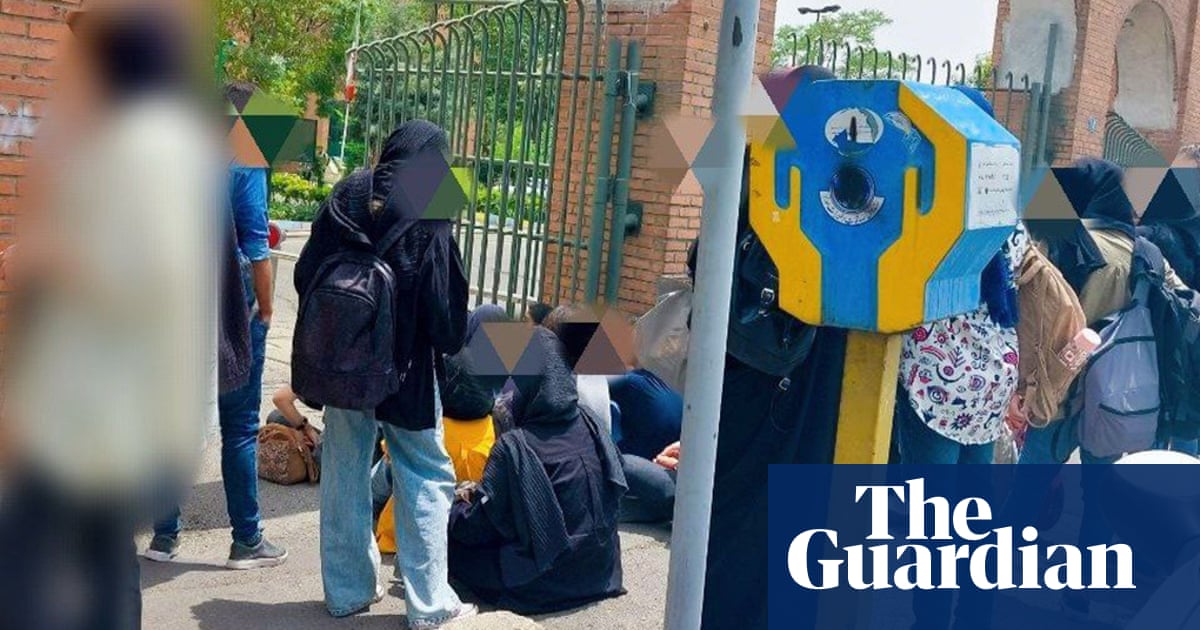- cross-posted to:
- [email protected]
- [email protected]
- [email protected]
- cross-posted to:
- [email protected]
- [email protected]
- [email protected]
Female students reportedly given sham disciplinary ‘hearings’, suspended from classes and threatened with ‘zero grades’ for defying head covering law.
At least 60 female students in Iran have reportedly been barred from university for flouting the country’s mandatory hijab law.
Videos recently shared by citizen journalists show the harassment of women and girls in subways, streets and university campuses by disciplinary committees and pro-regime civilians. In defiance, female university students across the country have been recording themselves without headscarves.
Several female activists have told the Guardian that detentions and arrests of young women are on rise. They said they have been warned of serious consequences if they fail to adhere to the mandatory hijab law.
The Guardian spoke to nine suspended students who fear their plans to study further are unclear after they were given suspensions and banned from their campuses.
“We’re being mass banned from the campus for refusing to wear a hijab, and in the past few days there has been a violent crackdown on us for peacefully sitting in protest,” said one student from a university in Tehran. She said security officials “violently threw us out of the classrooms”.
The student said their professors had been attacked and banned from the campus for supporting them.
The students’ council of Iranian universities has said that at least 40 female students were “conditionally suspended” from classes for failing “to fully observe” hijab rules. However, the NGO The Human Rights Activists in Iran (HRAI) say that at least 64 students have been suspended and three expelled.
Speaking on condition of anonymity, a student from the north-eastern city of Mashhad said: “I have been slapped with repeated temporary suspensions for protesting on the 40th day of Mahsa Amini’s death. Considering that I will be suspended again next semester, I will fall behind a whole year. I dream of studying abroad, but unfortunately, given the current situation, my future is dark.”
Students have also said the university security teams are violently raiding dormitories and kicking students out for sharing social media posts in support of protesters and those sentenced to death.
“Three days after I shared a post about death sentences, the university security team confiscated my phone after raiding our residence hall,” said a student from Tehran. “They also collected protest posters or anything related to the ongoing revolution and warned us of worse consequences.
“I doubt the officers barging into our dormitories are from the university’s security team. I’ve never seen them before. The next day, I was temporarily suspended along with three of my friends.”
The student was also warned that their course grades would be marked as zero.
Another student in Tehran said: “The university administration is acting like an extended arm of the Islamic Republic. I was preparing my applications for a master’s in the EU, but I fear I’ll neither receive a recommendation letter, nor will I receive the relevant grades necessary for my application. I’ve been warned by my university’s administration that I’ll get zero grades if I don’t apologise and retract my social media posts in support of the revolution.”
Jasmin Ramsey, deputy director of the non-profit Centre for Human Rights in Iran, said the Iranian government had a well-documented history of persecuting university students who were accused of participating in peaceful protests.
“Recent developments have revealed that university disciplinary committees in Iran have conducted sham ‘hearings’ where students and professors are treated as guilty without any opportunity to prove their innocence,” she said.
Another student said court-like trials were being held in universities, with women given a verdict based on the accusations and then suspended. However, she was stoical about her treatment saying: “There are those who lost their eyes; there are those who were murdered. Compared with what they’ve suffered for the freedom of Iran, my suspension is nothing.”
deleted by creator
These women are heroes, and they need as much support as we can give them.
Woman, Life, Freedom
Fuck the IR terrorists
What happened to Iran? I thought Iran was democratizing post-WW2… How did they end up in a theocratic authoritarian regime?
Good question.
Iran’s Prime Minister at the time was too left wing and his policies hurt American corporations.
The final straw was nationalising oil production so that its profits went to the citizens of Iran.
This led corporations to lobby the American government to get involved.
In steps the CIA to overthrow Iran’s democracy.
https://www.npr.org/2019/01/31/690363402/how-the-cia-overthrew-irans-democracy-in-four-days
The CIA did an oopsie. Or rather, the CIA got exactly what it wanted, which only later turned out to be bad for them.
But good for the corporations who lobbied the government into the action in the first place.
People from Iran, or people more in the loop, how has the country changed since the huge protests last year? These headlines still exist, so does that mean things are back to the old ways, or have there been any permanent changes?
While civil disobedience, especially among brave women, has increased, the situation not only has not improved but has also gotten worse. For example, banks are forced not to provide service to unveiled women, hefty fines and sometimes imprisonments are imposed on those who are without hijab, vehicles are seized because unveiled women have been captured by the CCTVs inside them, and so on.
These are aside from the continuous political oppression, mass arrests, tortures, and executions of those who publicly oppose the regime and the current situation in Iran. In the past two days, there have been reports of deaths among dissidents while in custody (apparently due to excessive torture and lack of medical care). Also, yesterday, Toomaj Salehi, a well-known Iranian rapper, who was extremely vocal during the Mahsa Amini protests and publicly sided with the people seeking freedom, was sentenced to more than 6 years in prison after being in solitary confinement for about 8 months.
So, in a nutshell, things have not improved because the root causes of the uprising are not and will not be resolved under this authoritarian regime. Clearly, things can’t go on like this in the long run, and change is inevitable. The only question is when!
Sorry to hear that, that sucks. Hope our children only read about these oppressions in the history books
I hope so :)
How long until the talibangelicals implement the same policies in the west?




